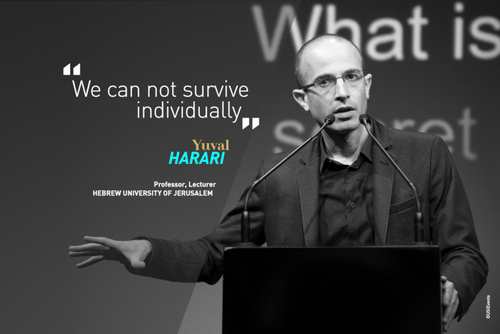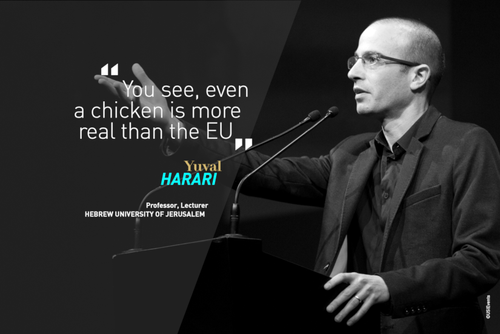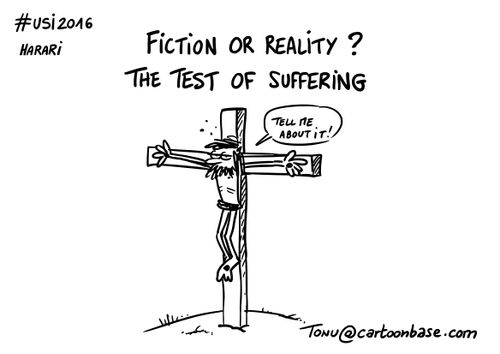Yuval Harari - How humans conquered the world
The Sapiens Secret of Success
It's hard for us to realize that a few thousand years ago several species of humans walked the Earth. Today, although one finds various persistent differences in cultural and physical traits, humans worldwide all belong to a single species: Homo Sapiens. And this species is clearly the uncontested ruler of the planet.
Surprising as this may seem, there was a time when humans had no greater impact on the ecosystem than other species of animals did. 13 million years later, we have become the most powerful species on Earth... Now that we are capable of creating organic life we have even taken over the task that belonged to the entity known as God. But we don't only create, we also destroy: over several thousands of years humans have eliminated many other species. True ethnic cleansing. In other words, humans have replaced natural selection by intelligently organized selection.
"We have transformed ourselves from insignificant animals to gods"
Unity makes strength
Our privileged condition as humans has convinced us of it: we are superior to all other animal species. However, while we are indeed different from other primates, it is not so much on an individual level as on a collective one.
Obviously we are not the only animals capable of cooperating flexibly to accomplish a common goal: chimpanzees do it too, but they don't do it by the thousands, nor with strangers. They need to know the other chimps to cooperate with them.
From a purely operational standpoint, other animals are also capable of cooperating in such large numbers: bees for example do it. And yet although they are organized, they cannot reinvent the systems of social cooperation in place. Unlike us, they are incapable of such flexibility. Bees follow an immovable pattern. They cannot for example revolt and behead their queen. To set up a communist regime!
"The reason we dominate? We are the only animal capable of cooperating in large numbers."
Humans on the other hand are capable of merging these two abilities: cooperating in very large numbers (by thousands, even millions) in a flexible way. This cooperation has made possible our greatest successes (traveling to the Moon), but also our worst atrocities (wars, genocides, etc.)
Imagination: the key to our success
"It's the imagination which empowers Homo Sapiens to cooperate in such large groups. As long as many people believe in the same idea, they can cooperate together."
Other animals also use communication, but only to describe reality. In addition to describing reality, humans also use language to describe a "fictive" reality: their own. There are numerous examples in all fields: religion, economics, the State, justice...
Yuval Harari observes that these are "all of the stories we have stored in our imaginations, to be able to live together in an orderly fashion. Even the modern economy is based on fictional entities: money, companies, an employee's salary".
The history of the creation of money is a good illustration. Originally, money is a fictive entity, without any intrinsic value. Today it's the most popular fiction in history: everybody believes it. Even the members of the Islamic State. When they invaded areas of Syria, they killed people and destroyed historical monuments to show their hatred. When they stormed the banks, they carefully kept the millions of dollars they found, bearing the state symbols of the US. Because they also believe in the fiction of money.
Read more : discover Daniel Cohen's talk : "Homo Economicus - How addicted are we to economic growth ?"
The most real construction of our future
Humans control the planet, and therefore its destiny. Of course we live in objective reality, but in our time have introduced a layer of subjective reality. And little by little the latter has taken precedence over the former.
Since we control the planet, we can change the course of our future. We have the necessary tools to establish the rules of the game of our destiny. But beware, we will have to manage to differentiate between objective reality and fiction. Yuval Harari concludes by explaining that the key element for doing so is to determine whether the entity in question is capable of feeling suffering.
"We panic when we overdraw our account at the bank, but we're constantly causing the suffering of real entities, other humans...".
Read more : Our interview with Yuval Harari : his thoughts on new technologies and the future of humanity
To go further, find the entire talk of Yuval Harari on our Youtube channel and the questions asked by the participants during the conference.




